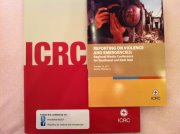SUMMARY
This is AI generated summarization, which may have errors. For context, always refer to the full article.

The International Committee of the Red Cross (ICRC) and representatives from various media organizations in East Asia, Southeast Asia and the Pacific gather today, October 14, in Manila to tackle theof reporting on violence and other emergencies.
Recognizing the role of media worldwide in forming opinion, Alain Aeschlimann of ICRC East Asia, Southeast Asia and the Pacific says “it will be interesting to discuss how media influence can mitigate the huminatarian consequences of acts of violence.
The following are the highlights of the morning session on the opportunities and challenges of reporting on violence and emergencies.
Humanitarian concern or professionalism?
Indonesia’s Tempo magazine deputy chief editor Yuli Ismartono of Tempo admits the dilemma of a journalist while covering disasters and conflict – humanitarian concern or professionalism. However, she stresses the importance of independence in reporting violence and disaster, challenging the media “to look at conflicts beyond the body counts.”
Ismartono also points out the challenge that citizen journalism poses: no timeline, no censorship, and able to be of great service to mainstream media– as in the cases of the Arab Spring and the Myanmar Saffron Revolution.
Social Media empowers the masses
Talking about the roles of online media in Thailand’s May 2010 crackdown, Pinpaka Ngamson of Thai news website Prachatai.com says Red Shirts protesters used Facebook and Twitter as their main platforms of expression amid government censorship.
Ngamson adds that the dramatic explosion of social media use in Thailand is partly due to protesters’ perception that they were marginalized by mainstream media.

Compassion fatigue
Pointing out the tendency of media to favor stories that are less complicated to understand, ICRC’s Phillippe Stoll asks, “Do journalists experience compassion fatigue if we are covering too many conflicts?”
However, he recognizes the risks that journalists share with aid workers in terms of casualty and pressure.
“It becomes more complicated when politics enters the game,” Stoll says.
Media self-regulation
Inquirer’s Isagani Yambot, talking on media responsibilities in the Philippines, says “self-regulation of media is enough.” He calls upon media to hold governments to account on disaster risk reduction management and to “serve only the public interest.”
On the afternoon, Al Jazeera’sVeronica Pedrosa, one of Asia’s best-known broadcast journalists will deliver the keynote address on the “The role of social media in contemporary conflicts.”

Add a comment
How does this make you feel?
There are no comments yet. Add your comment to start the conversation.